Deaths
which occurred on a 19 September:
2003 At least 13 Maoist rebels in fighting with government
troops near Karki village, Nepal. This is the second day of a three-day
general strike enforced by the rebels.
2002
General Robert Guei, Ivory Coast deposed military junta leader,
when his car refuses to stop at a military checkpoint in dowtown Abidjan
and is shot at by paramilitary police. This come after attack on government
sites in Abidjan and other cities. The attempted coup fails, but some 800
former soldiers who want reinstatement in the army, form the nucleus of
a rebellion that takes over Bouake and the surrounding region. The rebels
get support from mostly Muslim northerners who complain of discrimination
by the largely Christian southern-based government. Young ethnic Dioulas
armed by the rebels hunted down fleeing members of the government-supported
Baoule tribe. They chase them through the streets, stealing their belongings
and burning their homes. On 09 October 2002, Dioula youths would raid a
Baoule neighborhood and burn residents there alive. By then some 150'000
Bouake residents would have fled the city, mostly on foot carrying young
children and what belongings they can. Many of those displaced are from
the 3 million-strong immigrant population from neighboring Burkina Faso.
Many Ivorians in the largely Christian south suspect — in part because
the government insists that rebels are getting outside help — that
Muslim Burkina Faso has a hand in the rebellion. Thousands of Burkinabes
would be chased from their farms in a major cocoa- and coffee-growing region
around the southwestern town of Duekoue. Traders in cocoa around the world
brace for a steep increase in prices.
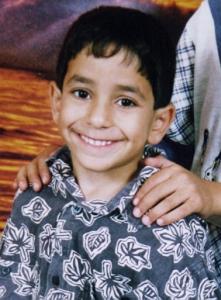 2002
Abdel Salam Samreen, 10 [< photo], Palestinian,
by six shots to the chest from Israeli troops, near his home in Ramallah,
West Bank. The boy's father had sent him to a nearby grocery to buy cigarettes.
The boy was crossing a street when he saw an Israeli tank nearby. He ran
away and tried to hide behind a wall. Then the soldiers started shooting
at him. 2002
Abdel Salam Samreen, 10 [< photo], Palestinian,
by six shots to the chest from Israeli troops, near his home in Ramallah,
West Bank. The boy's father had sent him to a nearby grocery to buy cigarettes.
The boy was crossing a street when he saw an Israeli tank nearby. He ran
away and tried to hide behind a wall. Then the soldiers started shooting
at him.
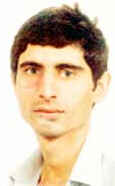 2002
Bus driver Yossi Mamistalov, 39 [photo >],
of Or Yehuda; Solomon Honig, 80, of Tel Aviv; Rosana Siso, 63, from Gan
Yavneh; Ofer Zinger, from Pezael in Jordan Valley; Yaffa Shemtov Hanoon,
49, from Tel Aviv; and a suicide bomber, as he boards a Dan coooperative
No. 4 bus on Alllenby Street near Rothschild Boulevard, between Yehuda Halevy
and Montefiore Streets, in downtown Tel Aviv, just after 13:00. 71 are injured.
One of them, Jonathan “Yoni” Jesner, 19, Jewish student from Glasgow,
Scotland, dies the next day. 2002
Bus driver Yossi Mamistalov, 39 [photo >],
of Or Yehuda; Solomon Honig, 80, of Tel Aviv; Rosana Siso, 63, from Gan
Yavneh; Ofer Zinger, from Pezael in Jordan Valley; Yaffa Shemtov Hanoon,
49, from Tel Aviv; and a suicide bomber, as he boards a Dan coooperative
No. 4 bus on Alllenby Street near Rothschild Boulevard, between Yehuda Halevy
and Montefiore Streets, in downtown Tel Aviv, just after 13:00. 71 are injured.
One of them, Jonathan “Yoni” Jesner, 19, Jewish student from Glasgow,
Scotland, dies the next day.
2002 The first victims of an
antigovernment uprising which start in Bouake, Ivory Coast.
1989 171 persons as UTA Flight772 from Brazzaville to Paris
explodes in the desert in Niger.
1985: At least 9500 in
earthquake of magnitude 8.0 — The Mexico City area is struck
by the first of two devastating quakes. Some 30'000 persons are injured,
100'000 are made homeless.
1982 Decenas de refugiados palestinos
masacrados en Beirut durante la ocupación israelí de la ciudad.
1980 Ventura Gassol, poeta y político español.
1971
William F. Albright, US biblical archaeologist.
1968 Chester Carlson, inventor of xerography
^top^
Chester Carlson invented the xerography
process in 1938. Carlson worked in the patent department of an electronics
firm and was frustrated at the difficulty of making copies of patent
drawings. He investigated various processes and developed xerography
after four years of experiments. He patented the process in 1940 but
failed to interest companies in producing copy machines until 1947,
when the Haloid Company of Rochester, New York, licensed the process.
The company, which later changed its name to Xerox, introduced its
first copy machine in 1958. |
1941 More than 1000 Russians as Germans bomb
Leningrad ^top^
As part of their offensive campaign
in the Soviet Union, German bombers blast through Leningrad's antiaircraft
defenses, and kill more than 1000 Russians Hitler's armies had been
in Soviet territory since June. An attempt by the Germans to take
Leningrad (formerly St. Petersburg) in August by a massive panzer
invasion had failed. Hitler had wanted to decimate the city and hand
it over to an ally, Finland, who was attacking Russia from the north.
But Leningrad had created an antitank defense sufficient to keep the
Germans at bay—and so a siege was mounted. German forces surrounded
the city in an attempt to cut it off from the rest of Russia. (Finland
eventually stopped short of an invasion of Leningrad, happy just to
recapture territory it had lost to the Soviet invasion in 1939.)
The halt of the German land attack
and the withdrawal of the panzer divisions to be used elsewhere did
not stop the Luftwaffe from continuing to raid the city. ("The Fuhrer
has decided to have St. Petersburg wiped off the face of the Earth,"
declared Hitler to his generals.) The air attack of the 19th was particularly
brutal; many of those killed were already recuperating from battle
wounds in hospitals, which were hit by German bombs.
The siege of Leningrad would last a total of 872 days and would prove
devastating to the population. More than 650'000 Leningrad citizens
died in 1942 alone, from starvation, exposure, diseases, and artillery
shelling from German positions outside the city. The only route by
which supplies could enter the city was via Lake Ladoga, which entailed
sleds negotiating ice during the winter. But the resources that got
through were only enough to prolong the suffering of the Leningraders.
Even tales of cannibalism began leaking out of the city. Soviet forces
were finally successful in breaking the siege in January 1944, pushing
the Germans 80 km from the city. Among those trapped in the city was
an air-raid warden born in St. Petersburg named Dimitri Shostakovich,
who wrote his Seventh Symphony during the siege. He was eventually
evacuated and able to perform his masterwork in Moscow. The US premiere
of the piece raised relief funds for the desperate Russians. |
1908 José Manuel Marroquín Ricaurte, político, escritor
y filólogo colombiano.
1895 Gerardina Jacoba van Bakhuyzen
Sande, Dutch artist born on 27 July 1826.
1891 José
Manuel Balmaceda, político chileno.
1890
540 victims of fire on Turkish frigate Ertogrul off of
Japan
1881 James A. Garfield, 20th president of
the US, of complications from bullet wounds
^top^
Eighty days after a failed office seeker shot him in Washington DC,
James A. Garfield, the twentieth president of the United States, died
of complications from his bullet wounds.
Born
in a log cabin in Ohio, Garfield was elected to the US House of Representatives
while serving as a Union colonel in the Civil War. He later became
a US senator and in 1880 was unexpectedly nominated as the presidential
candidate of the Republican Party. Successfully appealing to his humble
roots, he was elected the 20th US president over his Democratic opponent,
General Winfield Scott Hancock.
On 02 July 1881, only four months into his administration, President
Garfield was shot as he walked through a railroad waiting room in
Washington. His assailant, Charles J. Guiteau, was a disgruntled and
perhaps insane office seeker who had unsuccessfully sought an appointment
to the US consul in Paris. The president was shot in the back and
the arm and Guiteau was immediately arrested.
Garfield, mortally ill, was treated treated at the White House in
Washington and then taken to the seashore at Elberon, New Jersey,
where he attempted to recuperate with his family. The president never
left his sickbed and, during the 80 days before he died,: performed
only one official act: the signing of an extradition paper. During
this time, Vice President Chester A. Arthur served as acting president,
but there was confusion over whether he had the authority to do so,
as the Constitution was ambiguous on the matter of presidential succession.
On 19 September, after holding on for
eighty days, President Garfield died of blood poisoning. The following
day, Arthur was inaugurated as the twenty-first president of the United
States. Garfield had three funerals: one in Elberon, another in Washington,
where his body rested in state in the Capitol for three days, and
a third in Cleveland, Ohio, where he was buried. Charles Guiteau's
murder trial began in November, and on 25 January 1882, he was found
guilty and sentenced to death. On 30 June 1882, he was hanged in his
jail at Washington, DC.
El presidente
de los EE.UU. James Abram Garfield muere asesinado. Es el tercer mandatario
americano que muere de forma violenta.(siempre elegidos en años
divisibles por 20, desde 1840, y seguirá así hasta John
F. Kennedy, elegido en el 1960). |
1873 Giovanni Battista Donati, astrónomo italiano.
1863 Joseph Nigg, Austrian artist born on 13 October 1782.
1862 Hundreds of Rebs and Yanks at the Battle
of Iuka. ^top^
Union troops under General William
Rosecrans defeat a Confederate force commanded by General Sterling
Price at Iuka in northern Mississippi. The Battle of Iuka was part
of a Confederate attempt to prevent General Ulysses S. Grant from
reinforcing General Don Carlos Buell in central Tennessee. In the
fall of 1862, Confederate General Braxton Bragg had invaded Kentucky
to prevent the Rebels from losing any more territory in the West.
The Confederates hoped to keep Union forces in western Tennessee and
northern Mississippi occupied to prevent any transfer of troops to
Buell, who had moved north to stop the invasion of Kentucky. Sterling
Price and Earl Van Dorn commanded the two small Confederate armies
operating in northern Mississippi, while Ulysses S. Grant led the
Union forces in the area. In addition to preventing Yankee reinforcements
in Kentucky, the Confederates also hoped to invade western Tennessee.
Grant effectively thwarted both
of these objectives by sending troops under General William Rosecrans
to move on Price's army at Iuka from the south. He also dispatched
another force under General Edward Ord to approach Iuka from the west.
But poor communication and delays prevented a combined attack, and
Price launched a preemptive assault on Rosecrans on 19 September.
Despite the intense fighting, Rosecrans was able to hold Price's force
at bay. Repeated Confederate attacks resulted in heavy losses for
the Rebels: 1500 of 14'000 soldiers engaged. Yankee losses amounted
to 790 out of 17'000 present. With Ord's force nearby, Price realized
he was in danger of being trapped, and so he abandoned Iuka that evening.
Ord may have joined in the battle, but a strange quirk of nature known
as an "acoustic shadow" prevented him from hearing the sounds of battle
just a few miles away. Acoustic shadows form when sound is unable
to reach certain locations due to atmospheric conditions or terrain
features. Although he saw smoke, Ord assumed Rosecrans was burning
captured supplies |
1849 (1848?) Dominique-Louis-Féréal Papéty, French
painter born on 12 August 1815. — MORE
ON PAPÉTY AT ART “4” SEPTEMBER
— LINKS
— Daphnis
et Chloé — The
Temptation of St. Hilarion, detail. — An
Italian Peasant Girl — A
French Peasant Girl — The
Temptation of Saint Hilarion — A
Neapolitan Fisherman — An Italian
Peasant Woman and Child — A Chinese
Girl — Télémaque
chez Calypso
1843 Gaspard
Gustave de Coriolis, French physicist, engineer, mathematician.
1827 Louisiana banker stabbed with Bowie's
knife ^top^
After a duel turns into an all-out
brawl on this day in 1827, Jim Bowie disembowels a banker in Alexandria,
Louisiana, with an early version of his famous Bowie knife. The actual
inventor of the Bowie knife, however, was probably not Jim Bowie,
but rather his equally belligerent brother, Rezin Bowie, who reportedly
came up with the design after nearly being killed in a vicious knife
fight. The Bowie brothers engaged in more fights than the typical
frontiersman of the day, but such violent duels were not uncommon
events on the untamed margins of American civilization. In the early
nineteenth century, most frontiersmen preferred knives to guns for
fighting, and the Bowie knife quickly became one of the favorites.
Rezin Bowie had invented such a nasty
looking weapon that the mere sight of it probably discouraged many
would-be robbers and attackers. Designs varied somewhat, but the typical
Bowie knife sported a 23- to 38-cm blade sharpened only on one side
for much of its length, though the curved tip was sharpened to a point
on both sides. The double-edged tip made the knife an effective stabbing
weapon, while the dull-edge combined with a brass hand guard allowed
the user to slide a hand down over the blade as needed. The perfect
knife for close-quarter fighting, the Bowie knife became the weapon
of choice for many westerners before the reliable rapid-fire revolver
took its place in the post-Civil War period. |
1745 Jean-Baptiste van Loo, Flemish painter active in France,
born on 11 January 1684. — LINKS
— The
Triumph of Galatea
1692 Giles Corey is
pressed to death for standing mute and refusing to answer charges of witchcraft
brought against him. He is the only person in what is now the US to have
suffered this punishment.
1581 Frans Pourbus (or Poerbus)
Sr., Dutch painter born in 1545. — MORE
ON POURBUS AT ART “4” SEPTEMBER
— LINKS
— Abraham
Grapheus (full size; or half-size)
— Portrait
of a Young Woman — Portrait
of a Woman
1290 Santa María de Cervellón, religiosa
mercedaria española.
1180 Louis VII. Au retour d'un
pèlerinage, il prend froid et est terrassé par une hémiplégie. Il meurt
paralysé à l'abbaye de Saint-Port. Son successeur est Philippe II Auguste.
0821 Burial of Theodulf, poet, scholar, secretary of education,
and bishop of Orleans during Charlemagne's reign. After Charlemagne's death
he was accused of treason and imprisoned, but eventually pardoned in time
to die. |
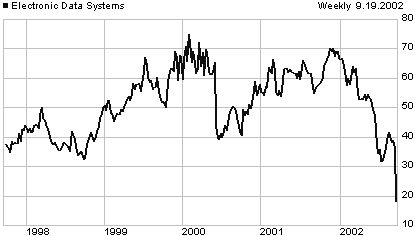 2003
Foul fowl sellers sentenced to between 15 months and 4 years and 3 months
in prison: David Lawton, 55; Robert Mattock, 59; George Allen, 47; and Gary
Drewett, 33; who, in Nottingham, England had pleaded guilty to fraud charges
for recycling 450 tons of chicken and turkey, which in most cases had been
deemed unfit even for pet food, into the human food chain. Some of it ended
up in products such as spreads and pates sold by major supermarket chains.
The four worked at the rat-infested Denby Poultry, whose owner, Peter "Maggot
Pete" Roberts, seems to have fled the country and was convicted in absencia
at an earlier trial.
2003
Foul fowl sellers sentenced to between 15 months and 4 years and 3 months
in prison: David Lawton, 55; Robert Mattock, 59; George Allen, 47; and Gary
Drewett, 33; who, in Nottingham, England had pleaded guilty to fraud charges
for recycling 450 tons of chicken and turkey, which in most cases had been
deemed unfit even for pet food, into the human food chain. Some of it ended
up in products such as spreads and pates sold by major supermarket chains.
The four worked at the rat-infested Denby Poultry, whose owner, Peter "Maggot
Pete" Roberts, seems to have fled the country and was convicted in absencia
at an earlier trial.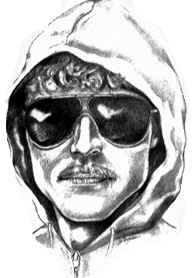 1995
The Washington Post publishes the "
1995
The Washington Post publishes the " 1952
1952
 2002
Abdel Salam Samreen, 10 [< photo], Palestinian,
by six shots to the chest from Israeli troops, near his home in Ramallah,
West Bank. The boy's father had sent him to a nearby grocery to buy cigarettes.
The boy was crossing a street when he saw an Israeli tank nearby. He ran
away and tried to hide behind a wall. Then the soldiers started shooting
at him.
2002
Abdel Salam Samreen, 10 [< photo], Palestinian,
by six shots to the chest from Israeli troops, near his home in Ramallah,
West Bank. The boy's father had sent him to a nearby grocery to buy cigarettes.
The boy was crossing a street when he saw an Israeli tank nearby. He ran
away and tried to hide behind a wall. Then the soldiers started shooting
at him. 2002
Bus driver Yossi Mamistalov, 39 [photo >],
of Or Yehuda; Solomon Honig, 80, of Tel Aviv; Rosana Siso, 63, from Gan
Yavneh; Ofer Zinger, from Pezael in Jordan Valley; Yaffa Shemtov Hanoon,
49, from Tel Aviv; and a suicide bomber, as he boards a Dan coooperative
No. 4 bus on Alllenby Street near Rothschild Boulevard, between Yehuda Halevy
and Montefiore Streets, in downtown Tel Aviv, just after 13:00. 71 are injured.
One of them, Jonathan “Yoni” Jesner, 19, Jewish student from Glasgow,
Scotland, dies the next day.
2002
Bus driver Yossi Mamistalov, 39 [photo >],
of Or Yehuda; Solomon Honig, 80, of Tel Aviv; Rosana Siso, 63, from Gan
Yavneh; Ofer Zinger, from Pezael in Jordan Valley; Yaffa Shemtov Hanoon,
49, from Tel Aviv; and a suicide bomber, as he boards a Dan coooperative
No. 4 bus on Alllenby Street near Rothschild Boulevard, between Yehuda Halevy
and Montefiore Streets, in downtown Tel Aviv, just after 13:00. 71 are injured.
One of them, Jonathan “Yoni” Jesner, 19, Jewish student from Glasgow,
Scotland, dies the next day. Summary
of The Lord of the Flies
Summary
of The Lord of the Flies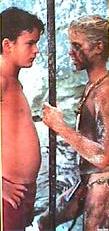 Jack and his choir group, who are now known as "the hunters" become
increasingly obsessed with hunting and killing pigs. To them, it is
the most important task on the island. All the young children are
preoccupied with the Beast, which they believe in as some kind of
animal living on the island. Jack says that he's been everywhere,
and there is no beast, and Piggy says that a beast can't exist in
a world with science.
Jack and his choir group, who are now known as "the hunters" become
increasingly obsessed with hunting and killing pigs. To them, it is
the most important task on the island. All the young children are
preoccupied with the Beast, which they believe in as some kind of
animal living on the island. Jack says that he's been everywhere,
and there is no beast, and Piggy says that a beast can't exist in
a world with science.